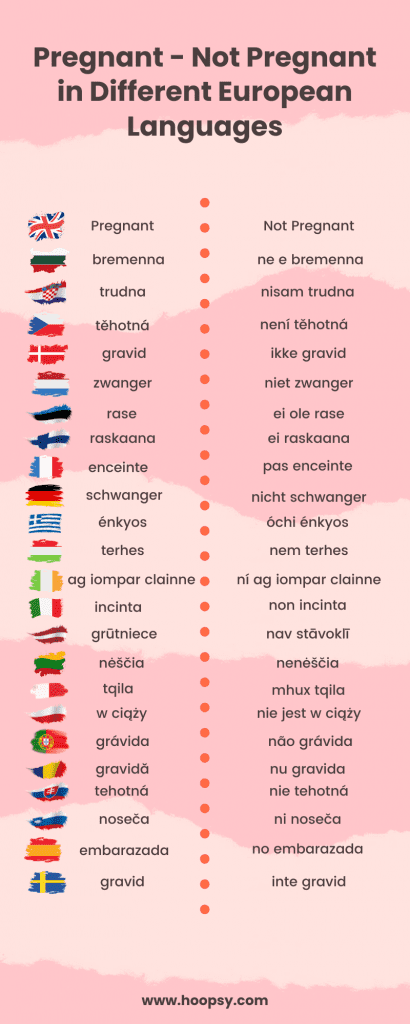Am I pregnant?? Or not?
A funny story, a friend of mine bought a digital pregnancy test online from Amazon (this was years ago before I knew her, otherwise I might have had to defriend her!) She got it home and did the test, only to find that the words on the test screen where actually in Spanish so she had no idea if she was or wasn’t pregnant!! After a bit of googling she got the answer, but this made me think, if you are in Europe this summer and the shop only has digital tests (as obviously you would buy a Hoopsy test if you could) then you might want to know what the words pregnant or not pregnant are in different European languages!
Pregnancy is a universal experience, but the actual words vary from language to language. When it comes to sharing news about your pregnancy there is of course the universal hand bump wave over your tummy. Whether you’re living abroad or just traveling, knowing how to say “pregnant” or “not pregnant” in different European languages can come in handy. In this blog post, we’ll take a look at how to say these phrases in different languages in Europe.

In English, we use the words “pregnant” and “not pregnant” to describe someone who is or is not expecting a baby. For Bulgarian on the other hand, they say “bremenna” for pregnant and “ne e bremenna” for not pregnant. For Croatian, the words are “trudna” and “nisam trudna.” While in Czech, “těhotná” and “není těhotná” respectively.
Additionally, here are the rest of the languages:
Danish: gravid – ikke gravid
Dutch: zwanger – niet zwanger
Estonian: rase – ei ole rase
Finnish: raskaana – ei raskaana
French: Enceinte – pas enceinte
German: schwanger – nicht schwanger
Greek: énkyos – óchi énkyos
Hungarian: terhes – nem terhes
Irish: ag iompar clainne – ní ag iompar clainne
Italian: incinta – non incinta
Latvian: grūtniece – nav stāvoklī
Lithuanian: nėščia – nenėščia
Maltese: tqila – mhux tqila
Polish: w ciąży – nie jest w ciąży
Portuguese: grávida – não grávida
Romanian: gravidă – nu gravida
Slovak: tehotná – nie tehotná
Slovenian; noseča – ni noseča
Spanish: embarazada – no embarazada
Swedish: gravid – inte gravid
So how do you know if you’re already expecting? Here’s one of our blogs giving you a list of the Early Signs of Pregnancy.
Also read: 14 Tips for How to Get Pregnant
In conclusion, expressing pregnancy in different languages can be challenging, but with a bit of practice, it becomes easier.
Whether you are already pregnant or not YET, it’s still interesting to know how to say these phrases. It allows you to communicate important news with ease, whether you’re talking to friends and family, or healthcare professionals when you’re in any of the European countries. Moreover, with this knowledge, you’ll be able to share your news with confidence and be better understood by those around you.




